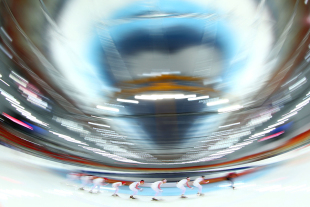- Premier League
I was lying to people's faces - Fletcher

Darren Fletcher has admitted he lied to his Manchester United team-mates as he battled career-threatening ulcerative colitis.
Fletcher, who turned 30 on Saturday, was diagnosed with the inflammatory bowel disease in 2010 and underwent lengthy treatment, including a series of operations, in order to make a return to United's first team.
The Scottish midfielder made an emotional comeback against Aston Villa in December and has made seven more appearances since as United's coaching team eases him back to full fitness.
Speaking at a United for Colitis charity dinner, Fletcher spoke openly about his suffering.
"At first my symptoms were very small it didn't have any real impact on my life or career," he revealed.
"It wasn't until it came back, in 2010, that I started my real battle with ulcerative colitis, which, ultimately, I've had to undergo surgical procedures to be sitting here today and to continue my career.
From Russia with gloves

- Our regular trip back in Week in Pictures find it's a winter wonderland for some, while the world's golfers and tennis players seek warmer climes and Jose Mourinho seeks divine intervention
- Click here for all the week's best images
"I remember when I was first diagnosed, being very blasé about it. Looking back now, that was quite immature, but I was a professional footballer, playing in the Premier League for Manchester United, and felt on top of the world, felt untouchable.
"My close family and friends knew, and I didn't hide it from the manager [Sir Alex Ferguson], but nobody else knew at the club.
"I stayed silent, but I found it very difficult making up stories for reasons why I wasn't at training, why I was looking ill, why I was rushing off to the bathroom. I was basically lying to people's faces.
"That was very hard. At the time I thought it was for the best because I believed, with the medication I was on at that time, I would be past it in a few months.
"But the longer it went on, I made a decision that it wasn't right. I wasn't comfortable with it and I thought it would help to tell people.
"Once I started talking about it and made it public knowledge, it was such a relief, the best thing I did. I've been very fortunate in that respect. I don't think I've endured too much ridicule."
The debilitating effects of the illness, which include an uncontrollable need to urinate, was a cause of persistent embarrassment for Fletcher.
"It took me four weeks before I went to the doctor," Fletcher added. "I was embarrassed about it. I was scared. It is not easy to talk about.
"You can be running to the toilet anywhere between 10 and 30 times a day without much time to get there, losing a lot of blood in the process as well.
"At times, my blood inflammation markers were so high and I was so weak that I ended up in hospital a couple of times on an IV drip.
"But since my condition became known, I've had so many letters from mums, dads and children, about how easy it has made their lives, the fact they can go to school and, instead of having to explain ulcerative colitis, they can simply say: 'I've got the same illness as Darren Fletcher.'
"There were no guarantees with surgery, but the surgeon was very confident I would get back to a normal life and be a good husband and a good dad. I've got a set routine now of how I live my life. I stick to that, it works fine and everything's great."
But that was not to be the last of Fletcher's embarrassment.
"The reception from the players in the dressing room after the Villa game, when they started singing and clapping and welcoming me back, I was mightily embarrassed," Fletcher joked.
"The manager also took a moment to single me out and the lads started clapping and cheering, so it was a nice moment.
"But I was very conscious from the beginning, when I came back, not to settle and be happy just because I was back. I didn't want to say, 'I have played 60 minutes, great' or 'I have played five to 10 games this season, that's great'.
"I wanted to look at it and not just say: 'Let's settle for just mediocrity.' I wanted to push myself and get back to where I was and play 40 games in a season and play in cup finals when the team gets there.
"I didn't want to be just happy to be back as a part of the squad because I thought that was a dangerous mind set to get into, where I would almost set myself a ceiling. It is something I have never done and I don't see any reason why I should do that now. I would like to think I can get back to my best because there is nothing stopping me now."

